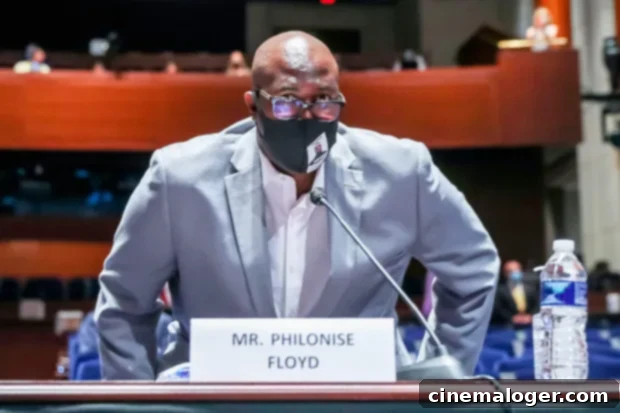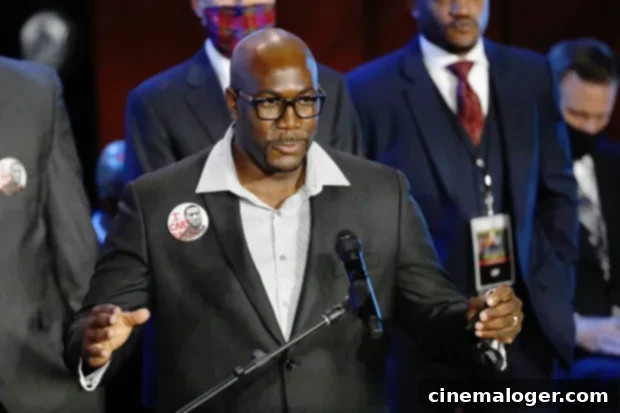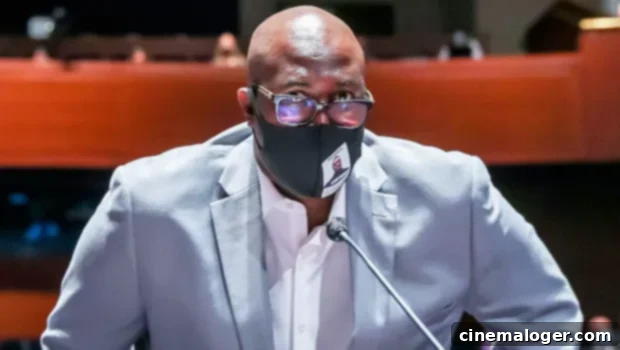Philonise Floyd’s Urgent Plea: Demanding Police Reform and Justice After George Floyd’s Death
On June 10, 2020, the nation and the world bore witness to a profoundly moving and urgent appeal from Philonise Floyd, who testified before the House Judiciary Committee. With raw emotion and unwavering resolve, he implored lawmakers to confront the pervasive issue of police brutality head-on. His central message was clear: his brother, George Floyd’s, tragic death must not be “in vain.” This poignant testimony served as a powerful catalyst, amplifying calls for meaningful legislative action and systemic change in law enforcement practices across the United States.
Philonise Floyd’s appearance before the committee was a moment of profound grief intertwined with an unyielding demand for justice. Fighting back tears, he spoke of George, the “big brother” he would never see again, during a gripping House Judiciary Committee hearing. His voice, heavy with sorrow, articulated a pain shared by countless families across the nation. “I’m tired. I’m tired of the pain I’m feeling now and I’m tired of the pain I feel every time another Black person is killed for no reason,” Floyd confessed to the assembled lawmakers. “I’m here today to ask you to make it stop. Stop the pain. Stop us from being tired.” He passionately urged them to ensure his brother’s cruel death would resonate as a turning point, marking an end to the pervasive cycle of racial injustice and police misconduct.
“Is that what a black man is worth? $20?”
George Floyd’s brother testifies at US Committee “If his death ends up changing the world for the better, and I think it will, then he died as he lived”https://t.co/LVw4zqVkJ5 pic.twitter.com/QVVxxYPzGM
— BBC News (World) (@BBCWorld) June 10, 2020
“This is 2020. Enough is enough,” Philonise declared, his voice trembling with a mixture of grief and conviction. “The people marching in the streets are telling you enough is enough. Be the leaders that this country, this world, needs. Do the right thing.” His words encapsulated the collective frustration and profound hope felt by millions demanding a fundamental shift in society. “The people elected you to speak for them, to make positive change. George’s name means something. You have the opportunity here to make your names mean something, too.” This was not merely a personal plea but a powerful call to action, reminding those in power of their solemn responsibility to their constituents and to history.
The tragic events leading to George Floyd’s death unfolded on May 25, 2020, in Minneapolis. He was arrested after a convenience store clerk alleged he had used a counterfeit $20 bill to purchase cigarettes. What began as a routine police interaction escalated into a fatal encounter that shocked the conscience of the world. During the arrest, a white police officer, Derek Chauvin, pinned George Floyd to the ground, kneeling on his neck for a harrowing nine minutes, despite Floyd’s repeated pleas, “I can’t breathe.” He tragically died soon after at the hospital, his final moments captured on bystander videos that quickly went viral, igniting global outrage.
The swift and widespread condemnation led to criminal charges against the officers involved. Chauvin was subsequently charged with second-degree murder, a charge later elevated to include third-degree murder and manslaughter. The three other officers present at the scene—Tou Thao, J. Alexander Kueng, and Thomas Lane—were charged with aiding and abetting murder, reflecting the collective responsibility demanded by justice. During his testimony, Philonise Floyd heartbreakingly questioned the value of his brother’s life in the eyes of the law: “He didn’t deserve to die over twenty dollars. I am asking you, is that what a Black man is worth?” This question cut to the core of systemic racial inequality and the disproportionate use of force against Black individuals by law enforcement.

The emotional toll of witnessing his brother’s death unfold on camera was evident in Philonise’s testimony. He wept openly, describing the agony of seeing “Perry”—George’s nickname—suffer. “I didn’t get the chance to say goodbye to Perry while he was here. I was robbed of that,” he lamented, articulating a profound sense of loss that resonated deeply with many. Throughout the hearing, Philonise Floyd wore a protective face mask emblazoned with a photo of George Floyd and his poignant last words: “I can’t breathe.” This powerful visual served as a stark reminder of the injustice and a silent protest against the brutal realities of police violence. The phrase “I can’t breathe” has since become a global rallying cry, symbolizing the struggle for racial justice and the urgent need for police accountability.
George Floyd’s death was not an isolated incident but a tragic culmination of a long history of police misconduct and systemic racial injustice. His killing ignited a wave of protests across the nation and around the world, mobilizing millions under the banner of the Black Lives Matter movement. Demonstrators, from diverse backgrounds and all walks of life, took to the streets, demanding an end to police brutality, racial profiling, and the persistent lack of accountability for officers who abuse their power. These widespread demonstrations highlighted the urgent need for legislative action and a fundamental rethinking of law enforcement’s role in communities.
In response to weeks of unprecedented protests and the growing demand for change, lawmakers on both sides of the House of Representatives acknowledged the imperative for reform. Congressional Democrats, demonstrating a concerted effort to address these systemic issues, introduced the groundbreaking Justice in Policing Act of 2020 on June 8. This comprehensive bill aims to overhaul police practices and enhance accountability through several key provisions. Among its proposed measures are mandatory dashboard and body cameras for federal officers, significantly increasing transparency and evidence collection during interactions. Furthermore, the bill calls for a nationwide ban on chokeholds and carotid holds, tactics that have proven to be lethal and are often disproportionately used against Black individuals.
A crucial component of the Justice in Policing Act is the ban on “no-knock” warrants for drug cases. This particular reform directly addresses tragic incidents like the death of 26-year-old Breonna Taylor, an emergency medical technician who was fatally shot in her Louisville, Kentucky apartment during a botched police raid involving such a warrant. The bill also seeks to create a national registry for police misconduct, making it more difficult for officers with a history of disciplinary issues to move between departments. Additionally, it aims to reform qualified immunity, a legal doctrine that often shields officers from civil lawsuits, thereby making it easier to hold them accountable for their actions in court. These reforms collectively represent a significant step toward transforming policing in America, focusing on transparency, de-escalation, and accountability to protect all citizens, especially those from marginalized communities.

Representative Jerry Nadler (D-NY), who chairs the influential House Judiciary panel, underscored the significance of the moment before the hearing commenced. He acknowledged the profound impact of the public’s outcry, stating, “Millions of Americans now call out ‘I can’t breathe’ as a rallying cry in the streets all across our country, demanding a fundamental change in the culture of law enforcement and meaningful accountability for officers who commit misconduct.” His subsequent declaration, “Today, we answer their call,” signified a commitment to translating public anguish into actionable policy. Philonise Floyd’s testimony, therefore, became a powerful conduit for these widespread demands, transforming personal tragedy into a universal plea for justice and a definitive end to racial bias in policing.
The call for justice and reform emanating from Philonise Floyd’s testimony is a pivotal moment in the ongoing struggle for civil rights. It underscores the profound responsibility of elected officials to listen to the voices of their constituents, particularly those who have suffered at the hands of systemic injustice. The pressure on lawmakers to enact meaningful change is immense, and the world watches to see if George Floyd’s death will indeed serve as the catalyst for transformative police reform. The promise that his death will not be “in vain” hinges on the legislative body’s capacity to pass comprehensive laws that ensure accountability, promote transparency, and protect the lives of all Americans, regardless of their race. This historic push for the Justice in Policing Act represents not just a response to a single tragedy but a concerted effort to dismantle deeply entrenched systems of racial inequality within law enforcement.
Ultimately, the legacy of George Floyd will be measured not only by the widespread condemnation of his killing but by the concrete actions taken to prevent future tragedies. Philonise Floyd’s courageous testimony is a powerful reminder that while pain and grief are deeply personal, the fight for justice and equity is a collective responsibility. It is a stark challenge to society to confront its failings and to build a future where every individual can breathe freely, without fear of police brutality. The movement sparked by George Floyd’s death continues to inspire, demanding that the echoes of “I can’t breathe” lead to lasting, meaningful change that upholds the dignity and rights of all people.
